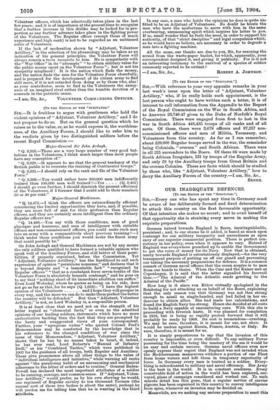recent Royal Commission :- Major - General Sir John Ardagh.
"Q. 3,316.—There are a very large number of very good bat- talions in the Volunteers, I think much larger than most people have any conception of."
"Q. 3,328.—It appears to me that the general tendency of the British public is to overrate the training of Continental troops."
"Q. 3,331.-1 should rely on the rank and file of the Volunteer Force."
"Q. 3,399.—You would rather have 300,000 men indifferently trained than 100,000 men well trained ?—Yes . . . . (Q. 3,401) I should go even further, I should diminish the present efficiency of the Volunteers, if I foresaw that I could add to their numbers 30 or 40 per cent."
Major-General Mackinnon.
"Q. 14,475.-1 think the officers are extraordinarily efficient considering the limited opportunities they have, and, if possible, they are more full of zeal for their profession than Regular officers, and they are certainly more intelligent than the ordinary Regular officers are."
"Q. 14,486.—You say with those conditions, men of good physique and keenness, and men of intelligence with suitable officers and non-commissioned officers, you could make such men into an army with a comparatively short previous training P—I think under these conditions you would make the finest army that could possibly be."
Sir John Ardagh and General Mackinnon are not by any means the only soldiers qualified to have formed a valuable opinion who speak well of the Auxiliary Forces, and still better of their possi- bilities, if properly organised, before the Commission. Yet "Adjutant, Volunteer Artillery," has the hardihood to call such expressions of opinion "pernicious nonsense," and declares that it is beyond dispute and "a lamentable fact" "recognised by Regular officers" "that as a combatant force seven-tenths of the Volunteer Force is absolutely beneath contempt," and he goes on to say that "nothing short of its immediate abolition can suffice." Even Lord Wolseley, whom he quotes as being on his side, does not go as far as this, for he says (Q. 1,658) : "I have the highest opinion of the Volunteers and I hope they will prosper in every way, and the more we can do to make them perfect the better the country -will be defended." But then "Adjutant, Volunteer Artillery," is not, as Lord Wolseley is, a responsible person.
It is at least clear that we need not on the strength of his letter regard as "elemental facts," or even as the admitted opinions of our leading soldiers, statements which have no more authoritative backing than the fact that they are prompted by the hasty and exaggerated views of your correspondent. Further, your "egregious writer" who quoted Colonel Peers Memorandum may be comforted by the knowledge that in his references to the changed conditions of war since the issue of that Memorandum, "Adjutant, Volunteer Artillery," shows that he has by no means taken to heart, if, indeed, he has ever read, Lord Roberts's "Manual of Infantry Drill," or his "Combined Tactics," which were published in 1902 for the guidance of all troops, both Regular and Auxiliary. These give prominence above all other things to the value of "individual intelligence and initiative," while warning all ranks against "the paralysing habit of an unreasoning and mechanical adherence to the letter of orders and-to routine." General Baden- Powell has declared the most important attributes of a soldier to be cunning, courage, and common-sense. If "Adjutant, Volun- teer Artillery," would prefer, as by his own showing he would, one regiment of Regular cavalry to ten thousand Yeomen (the annual cost of these two bodies is about the same), perhaps he will pardon me for telling him that he is wanting in the third attribute. In any case, a man who holds the opinions he does is quite unp fitted to be an Adjutant of Volunteers. No doubt he treats the men who have the misfortune to serve with him in the same overbearing, unreasoning spirit which inspires his letter to you. If so, small wonder that he feels the need, in order to support is authority, of that "strict discipline" and legal compulsion which; as he would have us believe, are necessary in order to degrade a man into a fighting machine.
All the same, our thanks are due to you, Sir, for rescuing the screed from the waste-paper basket, for which, apparently, your correspondent designed it, and giving it publicity. For is it not an interesting testimony to the survival of a species of soldier commonly reported to be extinct ?
—I am, Sir, Sec., ROBERT A. JOHNSON. ;


























































 Previous page
Previous page